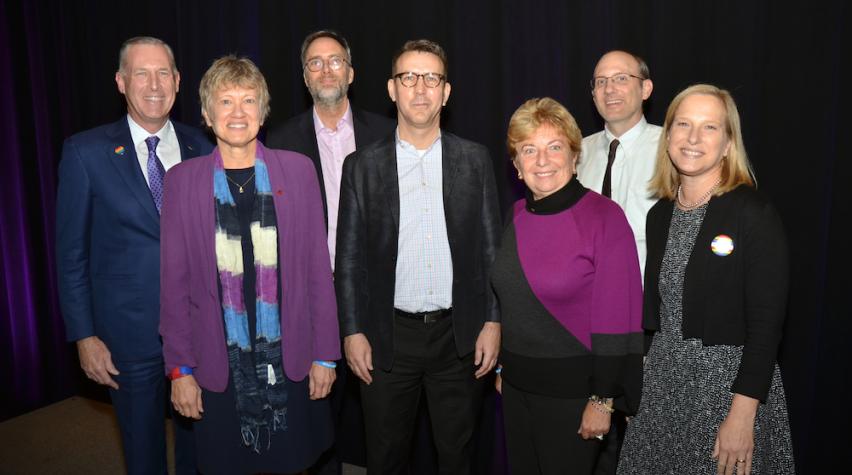
Above: Panelists and Safe Zone Workshop Creators at AIChE's 2018 LGBTQ+ Inclusion in Engineering. Pictured left to right: Jim Fitterling, Chief Executive Officer, The Dow Chemical Company, and Chief Operating Officer, DowDuPont Materials Science Division; Gayle J. Gibson, Director, Engineering Dupont (retired); John Vasko, AIChE Director of Communications and Liaison for LGBTQ+ & Allies Initiative; Eric Reiner, Professor, University of California, Berkeley; Deborah Grubbe, Owner and President of Operations and Safety Solutions; Tony Butterfield, Professor, Chemical Engineering at University of Utah; and Stephanie Farrell, Professor and Founding Chair of Experiential Engineering Education, Rowan University (USA), and the 2018–19 President of the American Society for Engineering Education.
During company discussions on issues of diversity, the lesbian, gay, bisexual transgender, queer, intersex, ally, and plus (LGBTQIA+) community is often overlooked. Gayle Gibson, a retired ChE who identifies as a lesbian, advocates for an inclusive environment in the workplace, where members of the LGBTQIA+ community feel safe and accepted. Discussing matters of gender, race, and sexuality is particularly important in science, math, technology, and engineering (STEM) fields, which historically lack diversity.
In her 34 years at DuPont, Gibson worked in engineering design, plant improvement, research and development (R&D), new product and process development, manufacturing, supply chain, and business improvement, climbing the corporate ladder to executive management over that time. Her journey of coming out in corporate America is similar to those of many others in the LGBTQIA+ community.
“I went to college in Texas and then worked at an Oklahoma oil company in the late 1980s,” she says. “And those were not times to be out, especially in those portions of the country. So I was closeted, pretty closeted, for the first half of my career. I worked in a manufacturing environment, which also did not feel like the kind of place to be out. When you’re working a shift at a manufacturing plant and it’s 2 AM in the South, and somebody has a pickup truck with a Confederate flag on it — you never want to assume, but you do have a bit of a radar.”
A 2019 study published by researchers at the Univ. of Michigan found that members of the community typically experience more underhanded discrimination, such as insensitive comments and a general lack of inclusivity. There is a rhetoric common within the STEM fields that discussions about sexuality do not belong in engineering or corporate life in general, according to Gibson.
On his first day at Chevron, Kirk Nass put a photo of his beloved husband on his desk, and throughout his time at the company, he remained a staunch advocate for LGTBQIA+ rights in the workplace. In fact, Nass headed Chevron’s LGBT employee network for its first 10 years, and later, as a manager, he coached and mentored other LGBTQIA+ employees.
Despite his confidence, Nass has encountered prejudice as a gay man. He recalls an instance when he was cautioned by a supervisor to “not wear a pink shirt” to a meeting with a certain technical manager. He was advised by another supervisor to be less emotional during meetings, whereas several other heterosexual managers who were well-known for losing their tempers were not given this advice.
Being an ally today is more important than ever. Stephanie Farrell has worked at Rowan Univ. for 23 years, and is currently serving as Interim Dean of the College of Engineering. As part of her role, she works with various groups to encourage inclusivity on campus.
Farrell has been a quiet supporter of the LGBTQIA+ for decades. Growing up, her best friend, Jim, came out as gay to Farrell — he confided in her, and they formed a deep friendship. As the years passed, Jim became a lawyer and worked in the LGBTQIA+ community, taking pro bono cases for asylum seekers — individuals who had been forced to leave their home countries because they were being persecuted, jailed, or even tortured on the basis of their sexuality. Seven years ago, Jim passed away, and Farrell has since taken up the torch and incorporated LGBTQIA+ outreach into her own career.
To hear more stories about individuals like these and related content, stay tuned to ChEnected during June as we feature a short series on the LGBTQIA+ community throughout Pride Month.
This post draws from a longer article about LGBTQIA+ members in the ChE community that was originally published in CEP.


